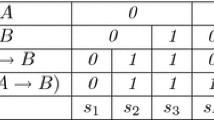Abstract
The creation of paraconsistent logics have expanded the boundaries of formal logic by introducing coherent systems that tolerate contradictions without triviality. Thanks to their novel approach and rigorous formalization they have already found many applications in computer science, linguistics and mathematics. As a natural next step, some philosophers have also tried to answer the question if human everyday reasoning could be accurately modelled with paraconsistent logics. The purpose of this article is to argue against the notion that human reasoning is paraconsistent. Numerous findings in the area of cognitive psychology and cognitive neuroscience go against the hypothesis that humans tolerate contradictions in their inferences. Humans experience severe stress and confusion when confronted with contradictions (i.e., the so-called cognitive dissonance). Experiments on the ways in which humans process contradictions point out that the first thing humans do is remove or modify one of the contradictory statements. From an evolutionary perspective, contradiction is useless and even more dangerous than lack of information because it takes up resources to process. Furthermore, it appears that when logicians, anthropologists or psychologists provide examples of contradictions in human culture and behaviour, their examples very rarely take the form of: \((p \wedge \lnot p)\). Instead, they are often conditional statements, probabilistic judgments, metaphors or seemingly incompatible beliefs. At different points in time humans are definitely able to hold contradictory beliefs, but within one reasoning leading to a particular behaviour, contradiction is never tolerated.
Similar content being viewed by others
Notes
a in the law of identity is understood as a single term rather than a proposition.
This type of proof is called “non-constructive”, in opposition to “constructive” proof, which is stronger.
Originally published in Polish under the title: “O zasadzie sprzeczności u Arystotelesa. Studium krytyczne.”
As translated by Vernon Wedin in 1971.
In logic such an act would be described in terms of reasoning about “possible worlds,” whereas in psychology such reasonings are called: “counterfactual reasonings” (Roese 1997).
“Slowly” in terms of the “slow thinking,” described by Kahneman (2011) as deliberative, highly conscious and logical form of thinking.
This definition is a practical version of the popular in philosophy way of defining “belief” as an attitude of regarding something as true (Schwitzgebel 2006-Stanford).
Some logicians posit that paraconsistent logics are based on a misunderstanding or fallacy, since they argue that negation which does not obey the law of non-cotradiction is not really a negation (Quine 1970; Slater 1995). In our work we assume that paraconsistent logics successfully achieve what they claim.
Formalized by Arruda (1977).
A common view of neuroscientists and psychologists on the nature of the mind is summed up in the quote by Swaab (2014, p. 5): “The product of the interaction of all these billions of neurons is called ‘mind’. Just as kidneys produce urine, the brain produces mind (...)”
Of course, linguistic premises alone would not be sufficient to explain human behaviour as they would not properly represent e.g. emotions.
By B the authors most probably mean \(\lnot A\).
References
Anderson, M. L., Gomaa, W., Grant, J., & Perlis, D. (2013). An approach to human-level commonsense reasoning. In K. Tanaka, F. Berto, E. Mares, & F. Paoli (Eds.), Paraconsistency: Logic and applications (pp. 201–222). Dordrecht: Springer.
Arruda, A. I. (1977). On imaginary logic of N.A. Vasiliev. In A. I. Arruda, N. C. A. da Costa, & R. Chuaqui (Eds.), Nonclassical logics, model theory and computability (pp. 3–24). Amsterdam: North-Holland.
Bastide, R. (1955). Le principe de coupure et le comportement afro-brésilien. Anais do XXXL Congresso Internacional de Americanistas, 1, 493–503.
Berliner, D., Lambek, M., Shweder, R., Irvine, R., & Piette, A. (2016). Anthropology and the study of contradictions. HAU: Journal of Ethnographic Theory, 6(1), 1–27.
Béziau, J. Y. (1999). The future of paraconsistent logic. Logical Studies, 2, 1–23.
Byrne, R. M., & Walsh, C. A. (2005). Resolving contradictions. In V. Girotto & P. N. Johnson-Laird (Eds.), The shape of reason (pp. 107–122). London: Psychology Press.
Calabretta, R., & Parisi, D. (2005). Evolutionary connectionism and mind/brain modularity. In W. Callebaut & D. Rasskin-Gutmann (Eds.), Modularity. Understanding the development and evolution of natural complex systems (pp. 309–330). Cambridge: MIT Press.
Chan, S.-F. F. (2000). Formal logic and dialectical thinking are not incongruent. American Psychologist, 55(9), 1063–1064.
da Costa, N., Béziau, J. Y., & Bueno, O. (2005). On the usefulness of paraconsistent logic. In D. Vanderveken (Ed.), Logic. Thought and action. Berlin: Springer.
da Costa, N. C., Beziau, J. Y., & Bueno, O. (1995). Paraconsistent logic in a historical perspective. Logique et Analyse, 38(150/152), 111–125.
Deguchi, Y., Garfield, J. L., & Priest, G. (2008). The way of the dialetheist: Contradictions in Buddhism. Philosophy East and West, 58(3), 395–402.
DeMotta, Y., Chao, M. C. H., & Kramer, T. (2016). The effect of dialectical thinking on the integration of contradictory information. Journal of Consumer Psychology, 26(1), 40–52.
Derry, S. J. (1996). Cognitive schema theory in the constructivist debate. Educational Psychologist, 31(3–4), 163–174.
Festinger, L. (1962). A theory of cognitive dissonance (Vol. 2). Stanford: Stanford university press.
Fletcher, J., & Olwyler, K. (1997). Paradoxical thinking: How to profit from your contradictions. Oakland: Berrett-Koehler Publishers.
Goldman, A. I. (1978). Epistemics: The regulative theory of cognition. The Journal of Philosophy, 75(10), 509–523.
Harmon-Jones, E., & Harmon-Jones, C. (2007). Cognitive dissonance theory after 50 years of development. Zeitschrift für Sozialpsychologie, 38(1), 7–16.
Johnson-Laird, P. N., Girotto, V., & Legrenzi, P. (2004a). Reasoning from inconsistency to consistency. Psychological Review, 111(3), 640.
Johnson-Laird, P. N., Legrenzi, P., & Girotto, V. (2004b). How we detect logical inconsistencies. Current Directions in Psychological Science, 13(2), 41–45.
Kaaronen, R. O. (2018). A theory of predictive dissonance: Predictive processing presents a new take on cognitive dissonance. Frontiers in Psychology, 9, 2218.
Kahneman, D. (2011). Thinking, fast and slow. New York: Macmillan.
Kalra, A., Li, S., & Zhang, W. (2011). Understanding responses to contradictory information about products. Marketing Science, 30(6), 1098–1114.
Knauff, M., & Spohn, W. (2021). Handbook on rationality. Cambridge, MA: MIT Press.
Lao-Zi (1993). The book of Lao Zi. (Jiyu R, Trans.). Beijing: Foreign Language Press. (Original work published 570-490 BC).
Lehman, B., D’Mello, S. K., Strain, A. C., Gross, M., Dobbins, A., Wallace, P., et al. (2011). Inducing and tracking confusion with contradictions during critical thinking and scientific reasoning. In International conference on artificial intelligence in education (pp. 171–178). Berlin: Springer.
Lévy-Bruhl, L. (1910). Les fonctions mentales dans les sociétés inférieures (Vol. 310). Paris: Alcan.
Luchins, A. S., & Luchins, E. H. (1965). Reactions to inconsistencies: Phenomenal versus logical contradictions. The Journal of general psychology, 73(1), 47–65.
Łukasiewicz, J. (1910). O zasadzie sprzeczności u Arystotelesa. Studium krytyczne [On the principle of contradiction in Aristotle. A critical study]. Kraków: PAU.
Łukowski, P. (2011). Paradoxes (31st ed.). New York: Springer.
Manktelow, K. I. (2012). Thinking and reasoning: An introduction to the psychology of reason, judgment and decision making. London: Psychology Press.
Marshall, S. P. (1995). Schemas in problem solving. Cambridge: Cambridge University Press.
McGinnis, N. D. (2013). The unexpected applicability of paraconsistent logic: A Chomskyan route to dialetheism. Foundations of Science, 18(4), 625–640.
McGrath, A. (2017). Dealing with dissonance: A review of cognitive dissonance reduction. Social and Personality Psychology Compass, 11(12), e12362.
Medaglia, M. T., Tecchio, F., Seri, S., Di Lorenzo, G., Rossini, P. M., & Porcaro, C. (2009). Contradiction in universal and particular reasoning. Human Brain Mapping, 30(12), 4187–4197.
Megill, J. L. (2004). Are we paraconsistent? On the Luca–Penrose argument and the computational theory of mind. Auslegung, 27(1), 1–30.
Newby-Clark, I. R., McGregor, I., & Zanna, M. P. (2002). Thinking and caring about cognitive inconsistency: When and for whom does attitudinal ambivalence feel uncomfortable? Journal of Personality and Social Psychology, 82(2), 157.
Nisbett, R. E., Peng, K., Choi, I., & Norenzayan, A. (2001). Culture and systems of thought: Holistic versus analytic cognition. Psychological Review, 108(2), 291.
Novaes, C. D. (2007). Contradiction: The real philosophical challenge for paraconsistent logic. In J.-Y. Beziau, W. Carnielli, & D. Gabbay (Eds.), Handbook of paraconsistency (pp. 465–480). Amsterdam: Elsevier.
Ogien, R. (2011). L’influence de l’odeur des croissants chauds sur la bonté humaine: et autres questions de philosophie morale expérimentale. Paris: Grasset.
Osherson, D., Perani, D., Cappa, S., Schnur, T., Grassi, F., & Fazio, F. (1998). Distinct brain loci in deductive versus probabilistic reasoning. Neuropsychologia, 36(4), 369–376.
Peng, K., & Nisbett, R. E. (1999). Culture, dialectics, and reasoning about contradiction. American Psychologist, 54(9), 741.
Pietryga, A. (2004). On the so called psychological law of non-contradiction. Studia Semiotyczne—English Supplement, 25, 57.
Porcaro, C., Medaglia, M. T., Thai, N. J., Seri, S., Rotshtein, P., & Tecchio, F. (2014). Contradictory reasoning network: An EEG and FMRI study. PLoS ONE, 9(3), e92835.
Purves, D., Cabeza, R., Huettel, S. A., LaBar, K. S., Platt, M. L., Woldorff, M. G., et al. (2008). Cognitive neuroscience. Sunderland: Sinauer Associates Inc.
Quine, W. V. (1970). Philosophy of logic. Englewood Cliffs, NJ: Prentice-Hall Inc.
Roese, N. (1997). Counterfactual thinking. Psychological Bulletin, 121(1), 133–148.
Rudnicki, K., & Lukowski, P. (2019). Psychophysiological approach to the Liar paradox: Jean Buridan’s virtual entailment principle put to the test. Synthese. https://doi.org/10.1007/s11229-019-02107-x.
Schwitzgebel, E. (2006). Belief. In E. N. Zalta (Ed.), The stanford encyclopedia of philosophy (Fall 2019 Edition). https://plato.stanford.edu/archives/fall2019/entries/belief/.
Sharpe, D., & Lacroix, G. (1999). Reasoning about apparent contradictions: Resolution strategies and positive–negative asymmetries. Journal of Child Language, 26(2), 477–490.
Slater, B. H. (1995). Paraconsistent logics? Journal of Philosophical Logic, 24(4), 451–454.
Spencer-Rodgers, J., Peng, K., Wang, L., & Hou, Y. (2004). Dialectical selfesteem and east–west differences in psychological well-being. Personality and Social Psychology Bulletin, 30(11), 1416–1432.
Stuchliński, J. A. (1994). Pragmatyczno-logiczna zasada sprzeczności. W obronie Arystotelesa. Filozofia Nauki, 2(1), 37–53.
Swaab, D. (2014). We are our brains: From the Womb to Alzheimer’s. Penguin UK.
Walton, D. N. (1990). What is reasoning? What is an argument? The Journal of Philosophy, 87(8), 399–419.
Wertheim, J., & Ragni, M. (2020). The neurocognitive correlates of human reasoning: A meta-analysis of conditional and syllogistic inferences. Journal of Cognitive Neuroscience, 32(6), 1061–1078.
Wong, W. C. (2006). Understanding dialectical thinking from a cultural-historical perspective. Philosophical Psychology, 19(2), 239–260.
Wood, M. J., Douglas, K. M., & Sutton, R. M. (2012). Dead and alive: Beliefs in contradictory conspiracy theories. Social Psychological and Personality Science, 3(6), 767–773.
Acknowledgements
I would like to thank Professor Piotr Łukowski from the Department of Logic, Jagiellonian University, for his invaluable help with conceptualizing and writing the manuscript.
Author information
Authors and Affiliations
Corresponding author
Additional information
Publisher's Note
Springer Nature remains neutral with regard to jurisdictional claims in published maps and institutional affiliations.
Rights and permissions
About this article
Cite this article
Rudnicki, K. The psychological aspects of paraconsistency. Synthese 199, 4393–4414 (2021). https://doi.org/10.1007/s11229-020-02983-8
Received:
Accepted:
Published:
Issue Date:
DOI: https://doi.org/10.1007/s11229-020-02983-8




